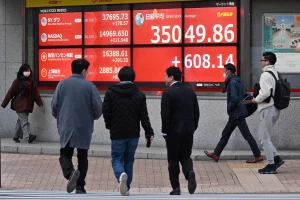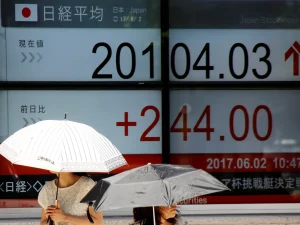Introduction In a significant development, Japan’s Nikkei index achieves a remarkable 34-year high, propelled by a weakening yen. This article explores the factors contributing to this surge, the implications for Japan’s economy, and the signals this milestone sends to investors and global financial markets. Nikkei’s Remarkable High: Key Factors 1. Weakening Yen The primary driver
Introduction
In a significant development, Japan’s Nikkei index achieves a remarkable 34-year high, propelled by a weakening yen. This article explores the factors contributing to this surge, the implications for Japan’s economy, and the signals this milestone sends to investors and global financial markets.
Nikkei’s Remarkable High: Key Factors

This image is taken from google.com
1. Weakening Yen
The primary driver behind Nikkei’s surge is the weakening yen. A depreciating currency often boosts the competitiveness of Japanese exports, positively impacting the profitability of export-oriented companies listed on the stock market.
2. Economic Recovery
Japan’s economic recovery, coupled with stimulus measures, has contributed to increased investor confidence. The combination of a weakened yen and positive economic indicators has created a favorable environment for stock market growth.
Haruki Tanaka’s Analysis
To provide expert analysis on this significant market development, we turn to Haruki Tanaka, a distinguished Financial Analyst. Tanaka shares his insights:
“The surge in the Nikkei index reflects a delicate balance between currency dynamics and economic recovery. The weakened yen is a double-edged sword, benefiting exporters while prompting investors to seek higher returns in the stock market.”
Implications for Japan’s Economy
1. Export Boost
A weaker yen enhances the competitiveness of Japanese exports in global markets, potentially leading to increased demand and export-driven economic growth.
2. Inflationary Pressures
While a weaker yen supports exports, it may also contribute to inflationary pressures, impacting domestic purchasing power and potentially influencing monetary policy decisions.
Signals for Investors and Global Markets

This image is taken from google.com
1. Investor Confidence
The Nikkei reaching a 34-year high signals a vote of confidence from investors in Japan’s economic prospects. Positive market sentiment often attracts further investment, contributing to sustained growth.
2. Global Market Impact
The surge in Japan’s stock market has ripple effects on global markets, influencing investor strategies and portfolio allocations. It also offers insights into broader trends in the global economy.
Conclusion: Riding the Currency Wave
Japan’s Nikkei index hitting a 34-year high amid a weakening yen showcases the intricate relationship between currency movements and stock market dynamics. As investors navigate this evolving landscape, the implications for Japan’s economic trajectory and the broader influence on global markets underscore the interconnected nature of the contemporary financial world. Stay tuned for ongoing analysis and updates as these trends continue to shape market outcomes.
















